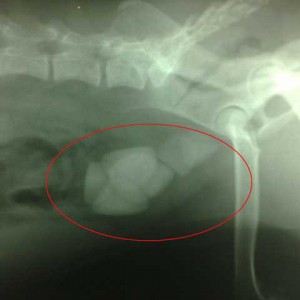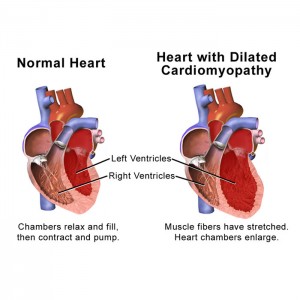Congestive heart failure (CHF) in dogs and cats
What is congestive heart failure (CHF)?
Heart failure occurs when the heart is unable to pump blood adequately to the body. Rather than a specific disease, heart failure is a syndrome that can be brought about by various diseases or disorders affecting the cardiovascular system; these conditions ultimately result in the failure of the cardiovascular system to maintain adequate blood circulation. Heart failure is not the same as heart disease. Heart disease can be present without ever leading to heart failure; however, heart failure can occur only if severe heart disease is present.
In heart failure, the reduced blood flow through the body is unable to supply organs with enough oxygenated blood for proper function. When the heart is unable to pump enough blood into the circulatory system, fluid can back up or accumulate within the organs, causing the organs to become swollen and to function abnormally. This syndrome is termed congestive heart failure (CHF) because fluid dams up within the organs, typically in the lungs, the space around the lungs and the abdomen, causing congestion of the tissues and malfunction of the affected organs.
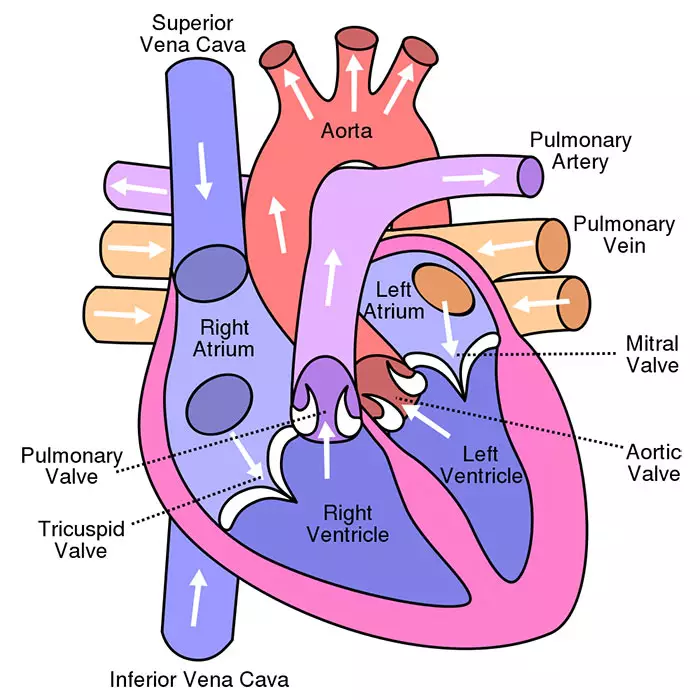
Source: https://www.petmd.com/sites/default/files/heart_diagram_1000.png
Congestive heart failure in dogs and cats can result from a failure on the left, right or both sides of the heart:
Right-sided congestive heart failure in dogs and cats
Right-sided congestive heart failure (RS-CHF) occurs as the result of heart disease in the right chamber of the heart. When the heart contracts, or pumps, the right ventricle pushes the blood through the lungs for oxygenation. However, in the case of RS-CHF, some of the blood leaks back through the tricuspid valve (the valve between the right atrium and right ventricle) into the right atrium. This creates increased pressure in the vessels delivering blood to the right atrium, as well as the body’s veins and capillaries, causing fluid to back up and consequently become “congested” within the systemic circulation (the main circulation of the body). Fluid may accumulate in the abdomen (a condition called “ascites”), the chest cavity and the liver, compromising the functioning of these organs. Fluid may also leak from veins in the limbs, causing an accumulation of fluid in the tissues, a condition called “peripheral oedema”.
Left-sided congestive heart failure in dogs and cats
Left-sided congestive heart failure (LS-CHF) is the most common form of congestive heart failure in dogs and cats. The classic signs of heart failure, coughing and fluid in the chest, are most commonly caused by LS-CHF.
LS-CHF occurs as the result of heart disease in the left chamber of the heart. When the heart contracts or pumps, the left ventricle pushes the blood into the systemic circulation (the main circulation of the body). However, in the case of LS-CHF, some of the blood leaks through the mitral valve back into the left atrium. This causes a backup of pressure in the vessels delivering blood to the left ventricle which in turn causes back up into the lungs. Fluid then penetrates the lung tissue and accumulates within the air sacs of the lungs, resulting in a condition called “pulmonary oedema” and typically causing breathing difficulties and coughing.
Biventricular congestive heart failure in dogs and cats
Biventricular failure can arise when both the right and left ventricles are not functioning properly, such as in dogs with dilated cardiomyopathy or poisoning causing heart muscle failure in both chambers.
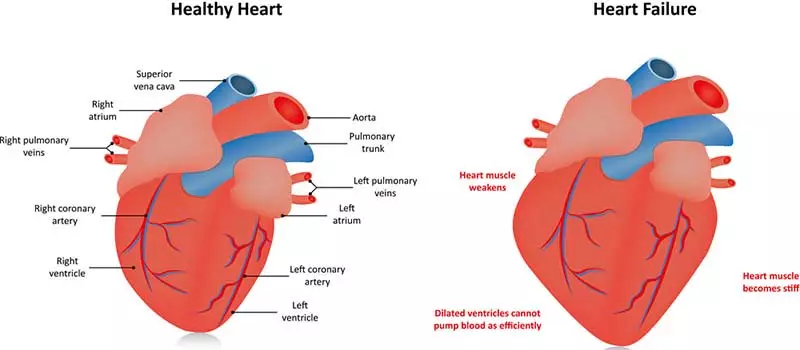
Source: https://topdogtips.com/wp-content/uploads/2019/02/Congestive-Heart-Failure-in-Dogs.jpg
Symptoms of congestive heart failure (CHF) in dogs and cats
Signs and symptoms associated with heart failure in dogs and cats depend on the causes of the heart failure and which heart chamber is affected. Breathlessness and lethargy are the most commonly observed signs; many animals with CHF will tire easily, have reduced stamina and no longer participate in playing or walking as they previously did. Depending on the degree of severity, signs of heart failure may appear while the animal is at rest, during mild exertion, or during moderate or extreme exercise. In the early stages, no signs may be evident.
As there are specific pathways by which heart disease culminates in heart failure, there are specific signs that can occur as a result of heart failure. Typically, these may include:
- Difficulty breathing
- Rapid breathing
- Noisy breathing
- Constant panting
- Open-mouthed breathing
- Coughing when at rest or sleeping
- Coughing blood
- Increased heart rate
- Heart murmur
- Unusual lung sounds
- Lethargy
- Exercise intolerance
- Persistent loss of appetite
- Weight loss
- Muscle wasting
- Blue or grey tongue and gums (an indication of severe breathing difficulty)
- Hind limb paralysis
- Swollen belly
- Enlarged liver
- Collapse
- Sudden death
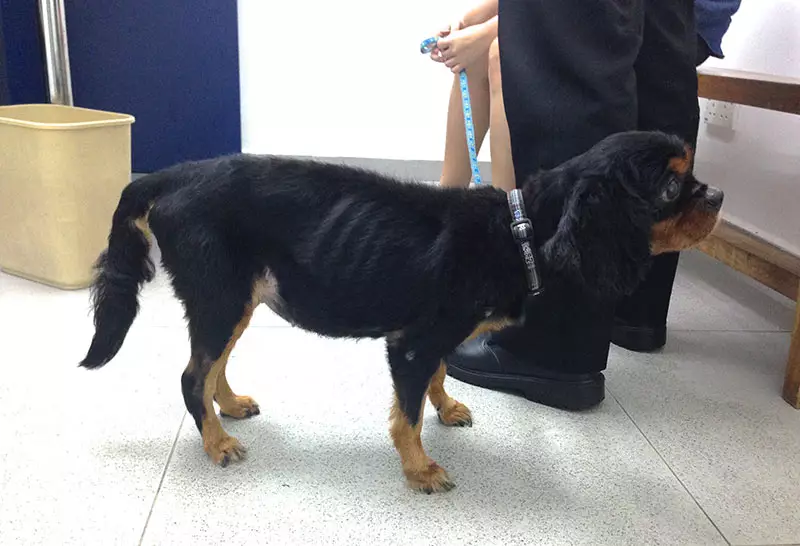
Kopie Covalier king Charles Spaniel with Congestive Heart Failure CHF swollen belly abdomen. Symptoms of congestive heart failure in dogs and cats.
Source: https://mountpleasantvetgroup.wordpress.com/2015/11/05/kopi-the-cavalier-king-charles-spaniel-congestive-heart-failure/
With left-sided congestive heart failure in dogs and cats, signs are often associated with pulmonary oedema, i.e. the accumulation of fluid within the lungs. The most common signs are:
- Persistent coughing
- Difficulty breathing
- Rapid breathing during sleep or rest
- Exercise intolerance (fatigue with trouble breathing associated with exercise)
- Fainting, due to lack of blood flow and oxygen to the brain
- A low heart rate
- Low blood pressure
- Collapse
Causes of congestive heart failure (CHF) in dogs and cats
Heart failure is a clinical syndrome that occurs secondary to severe and chronic cardiac disease. It occurs because the heart is no longer able to maintain one or more of the following functions at normal levels:
- Cardiac output, or the amount of blood pumped by the heart per minute
- Pressure within the veins and capillaries, or the force that the blood exerts against the vessel walls as the blood moves through them
- Systemic blood pressure, or the pressure exerted on blood vessels carrying blood from the heart to the body’s tissues
Causes of congestive heart failure in cats
CHF in cats can occur at any age, in any breed, and either gender, but it occurs more frequently in middle-aged to older animals. Maine Coons may be genetically predisposed to certain types of CHF.
There are many primary cardiac diseases and disorders that occur in cats and ultimately lead to CHF, including:
- Hypertrophic cardiomyopathy, the most common cause in cats, a condition that causes the walls of the heart to thicken and lose their ability to stretch and pump blood to the body.
- Hyperthyroidism, or thyroid disease
- High blood pressure
- Heart valve disorders
- Heart wall disorders
- Fluid in the heart sac (“pericardial effusion”)
- Blood clots in the heart
- Abnormalities of heart rhythm
- Heartworm disease
- Tumours
- Anaemia
Causes of congestive heart failure in dogs
There are several causes of congestive heart failure in dogs. Some of these may be congenital or inherited (where the dog was born with the heart defect), while some of the causes can be prevented. The most common primary cardiac disorders that can ultimately lead to congestive heart failure in dogs include:
- Mitral valve insufficiency (MVI), or a leaky mitral valve (the valve between the left atrium and the left ventricle) – it is estimated that 80% of canine CHF cases are caused by MVI. Initially, MVI results in LS-CHF. If left untreated, the heart failure may progress to involve both sides of the heart.
- Dilated cardiomyopathy (DCM), a disease of the heart muscle – a common cause in larger dogs, particularly Dobermans, Irish wolfhounds, and giant breed dogs.
- Abnormalities of heart rhythm – most commonly seen in Boxers
- Narrowing of some of the major blood vessels
- Heartworm infection – a preventable disease
Congenital (birth) defects that can ultimately result in CHF include:
- Subaortic stenosis (SAS) – a common congenital cardiac defect in dogs, particularly large breeds, but rare in cats, it is a narrowing along the aorta as it leads out of the heart.
- Ventricular septal defects (VSD) – a hole in the heart occurring in the septum, the wall that separates the right and left ventricles
- Persistent ductus arteriosus (PDA) – the most common congenital heart disease in dogs, it is caused by the failure of the ductus arteriosus muscle to constrict, leaving a passageway for blood flow and resulting in eventual left-sided heart disease and/or generalised heart failure. It is hereditary in several breeds.
- Chronic valvular heart disease (CVHD), which results in leaky heart valves – CVHD is more commonly seen in Cavalier King Charles Spaniels, miniature poodles, and smaller breeds of dogs.
- Tetralogy of Fallot – a congenital defect of the heart that involves four abnormalities:
- Ventricular septal defect (a hole between the two ventricles)
- Pulmonic stenosis (obstruction of blood flow through the pulmonary valve)
- An overriding aorta (the aorta is positioned directly over a ventricular septal defect (VSD), instead of over the left ventricle)
- Right ventricular hypertrophy (thickening of the heart muscle)
How is congestive heart failure (CHF) in dogs and cats diagnosed?
Congestive heart failure is usually diagnosed based on medical history, symptoms and physical examination findings, such as the presence of fluid in the lungs. To definitively diagnose congestive heart failure in dogs and cats and determine its underlying cause, the vet will usually perform several tests, such as:
Auscultation
Auscultation, or listening to the heart with a stethoscope, is the first step in diagnosing heart disease:
- A heart murmur may be detected; the murmur’s location and intensity may determine its significance
- The heart rhythm is evaluated, and if there are concerns, the vet may palpate or feel the pulse to determine its strength and rhythm
- The lungs are assessed, looking for evidence of changes associated with heart failure – with a stethoscope, sounds of congestion which may indicate the presence of fluid in the lungs can be detected.
Chest radiographs (x-rays)
Chest x-rays are taken to assess the size and shape of the heart and the blood vessels and to look for lung changes such as the presence of fluid.
Blood and urine tests
Tests including complete blood count, biochemical panel, thyroid hormone test, heartworm test, and urinalysis are performed to give an indication of any other disorders in the body. Liver and kidney function are often impaired in animals with heart disease. Cats may also be tested for feline immunodeficiency virus (FIV) and feline leukaemia (FeLV).
Electrocardiogram (ECG)
An electrocardiogram measures the electrical activity of the heart and allows accurate determination of both heart rate and rhythm. Abnormal rhythms can be detected and evaluated.
Echocardiogram
Echocardiogram utilises ultrasound waves to evaluate the heart. The size and thickness of each heart chamber can be measured, and the efficiency of the heart’s contractions (pumping) can be observed and measured.
Blood pressure measurements
Blood pressure will be measured.
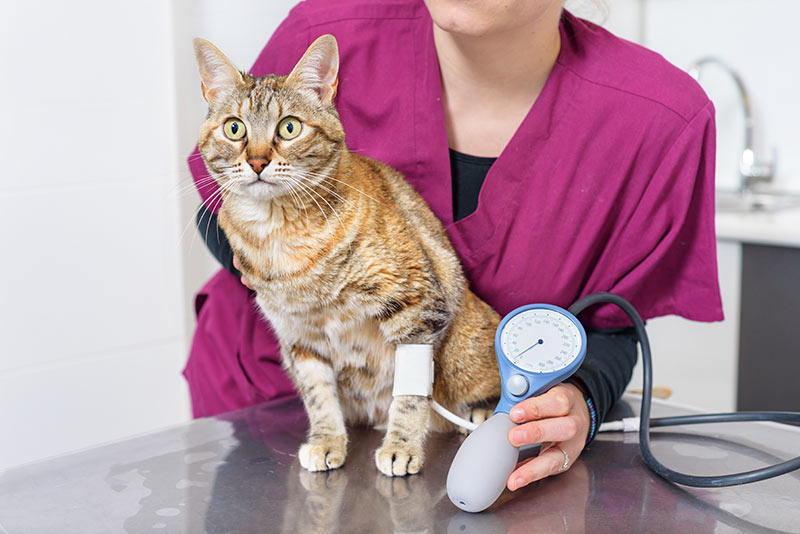
Prognosis
With accurate diagnosis of congestive heart failure and its underlying cause, combined with an optimal and tailored treatment regime, the prognosis for animals with CHF can be relatively optimistic. Early detection may significantly increase the chance of survival. Treatment is aimed at improving the length and quality of life; with appropriate treatment, many animals can live a normal life for many months or even years. However, despite the necessity of long-term medications, in most cases these do not cure the heart disease, and end-stage CHF can develop, requiring humane euthanasia.
Treatment for congestive heart failure (CHF) in dogs and cats
In most cases, congestive heart failure in dogs and cats cannot be cured. However, appropriate treatment can almost always improve the animal’s quality and length of life by achieving one or more of the following:
- Improving heart muscle function
- Normalising arrhythmias
- Controlling blood pressure
- Improving blood flow
- Reducing the amount of blood filling the heart before contraction
- Reducing the amount of fluid in the lungs, abdomen and/or chest cavity
In certain cases, treatment of the underlying condition may resolve CHF, for example in cats with hyperthyroidism. If the cause is an underlying congenital condition (a heart defect that was present from birth), surgical repair of the defect may resolve the CHF.
Medical therapies
There are many types of drugs that are be prescribed for treating CHF, depending on the symptoms, underlying cause and severity of the syndrome. After a thorough diagnosis, the veterinarian will decide on those that are most appropriate. Prescription medications can be used to control symptoms and improve the overall quality of life, and in most cases, will need to be given for the duration of the animal’s life. The prescribed medicines may include:
- Diuretics, for reducing fluid build-up
- A type of drug called positive inotropes, to improve heart muscle contractions; i.e. they help the heart beat more effectively
- Blood pressure medication, including ACE (angiotensin-converting enzyme) inhibitors and vasodilators, to dilate the blood vessels and thus lower blood pressure
- Beta-adrenergic blocking drugs (beta-blockers), to reduce blood pressure and improving blood flow
- Medications to treat heart arrhythmias
- Anti-anxiety medications for animals that are having severe trouble breathing
Nutrition
The aims of nutritional therapies for animals with heart failure include supplying adequate calories, reducing inflammation, balancing sodium, and supplementing any missing nutrients.
- A low-sodium diet may be recommended for animals with severe CHF, to help prevent fluid accumulation.
- In animals with mild to moderate CHF, diets high in salt and human foods (“table snacks”) should be avoided.
- Prescription diets tailored for differing levels of sodium restriction are available, as are sodium-free snacks.
- Supplementation with omega-3 fatty acids is thought to help decrease inflammation.
- Some types of heart failure are caused by a deficiency of a nutrient and can be treated by supplementation with the missing nutrient, for example, taurine supplementation in cats with verified deficiencies.
Other Treatments
In addition to drugs and nutrition, other types of treatment may be recommended. These include:
Hospitalisation:
If symptoms are severe, particularly if the animal is having difficulty breathing or has extremely low blood pressure, hospitalisation may be required. Oxygen therapy and removal of fluid from the chest or abdomen (see below) may be performed during hospitalisation.
Oxygen therapy:
Animals with severe left-sided CHF and fluid in the lungs (pulmonary oedema) may not get enough oxygen. Oxygen can be given by way of an oxygen cage, tight-fitting mask, oxygen collar, or nose tube.
Removal of fluid from the chest cavity or abdomen:
Thoracentesis and abdominocentesis are surgical procedures in which a needle is inserted into either the chest cavity or abdomen to withdraw excess fluid. It may be used to treat animals with CHF that have an accumulation of fluid in these areas. The procedure can lead to rapid improvement in symptoms and can be performed repeatedly, if necessary. When fluid build-up has been removed, the heart is able to pump blood more efficiently and the animal can breathe more easily.
Surgical Treatment:
Surgery may be recommended to treat cases of CHF that are caused by a birth defect or a congenital or acquired heart valve disease. This treatment option is often expensive and may require a surgical specialist.
Exercise program:
The vet may recommend a moderate exercise plan intended to strengthen the heart while keeping blood pressure under control. If the vet has not specifically recommended exercise, then the animal should be kept calm and activity should be limited.
Rest:
The vet may recommend rest; if the animal is overly active, the owner may need to intervene. Periodic cage rest may be necessary, and it may be helpful to set up barriers to limit space available for running and jumping.
Ongoing monitoring:
Periodic blood tests, radiographs, and echocardiograms are usually required to monitor the effects of treatment and the disease progression.
Prevention
As soon as possible after a dog or cat is diagnosed with a heart abnormality, the animal should be assessed to help prevent the development CHF. It is possible to live with heart disease for years without it developing into CHF, if the heart disease is controlled with appropriate treatment.
In summary
Congestive heart failure (CHF) is a condition that occurs when insufficient blood is circulated throughout the body, causing fluid to back up into, or congest in, the lungs or other organs. CHF can occur in either the right or left side of the heart, or in both sides.
CHF is usually the end result of severe, overwhelming cardiac dysfunction. In cats, it is commonly caused by hypertrophic cardiomyopathy, a thickening of the heart walls. In dogs, MVI (mitral valve insufficiency) is the most frequent cause of CHF. However, there are many other causes, including congenital problems, irregular heart rhythms and narrowing of some of the major blood vessels.
The most common symptoms of CHF are persistent coughing and difficulty breathing, typically caused by the accumulation of fluid in the lungs, as well as breathlessness and lethargy. If an animal is displaying possible symptoms, a prompt veterinary consultation is warranted.
CHF in dogs and cats is a life-threatening condition that requires immediate medical treatment. In most cases, it is not curable, and treatment is aimed at reducing the symptoms and improving the efficiency of the heart. Medical treatment options include diuretics help to reduce fluid build-up, vasodilators or ACE inhibitors to dilate the blood vessels, and positive inotropes to increase the amount of blood that is pumped through the body. Prescription medications will need to be used for the duration of the animal’s life. Other treatment options include nutritional modification, drainage of fluids and, in certain cases, surgery.
Bow Wow Meow Pet Insurance can help protect you and your pet should an unexpected trip to your vet occur.
- Find out more about our dog insurance options
- Find out more about our cat insurance options
- Get an instant online pet insurance quote


More information
- https://www.merckvetmanual.com/circulatory-system/heart-disease-and-heart-failure/heart-failure
- https://www.merckvetmanual.com/circulatory-system/heart-disease-and-heart-failure/overview-of-heart-disease-and-heart-failure
- https://www.merckvetmanual.com/dog-owners/heart-and-blood-vessel-disorders-of-dogs/heart-failure-in-dogs
- https://www.merckvetmanual.com/cat-owners/heart-and-blood-vessel-disorders-of-cats/heart-failure-in-cats
- https://vcahospitals.com/know-your-pet/congestive-heart-failure-in-dogs
- http://www.pethealthnetwork.com/dog-health/dog-diseases-conditions-a-z/congestive-heart-failure-dogs
- http://www.vetstreet.com/care/congestive-heart-failure-chf-in-cats
- https://wagwalking.com/cat/condition/congestive-heart-failure
- https://mountpleasantvetgroup.wordpress.com/2015/11/05/kopi-the-cavalier-king-charles-spaniel-congestive-heart-failure/






